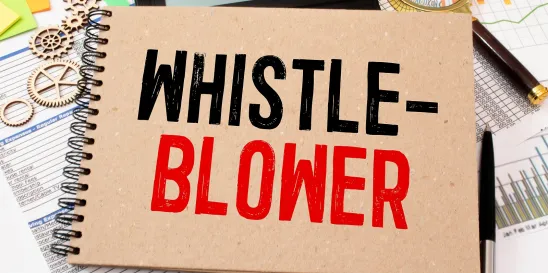On 7 March 2024, the US Department of Justice (DOJ) announced that it is launching a new whistleblower pilot program designed to reward individuals who report acts of significant corporate misconduct or financial wrongdoing (DOJ Whistleblower Program).1 The new DOJ Whistleblower Program follows in the footsteps of whistleblower programs at the US Securities and Exchange Commission (SEC) and the Commodity Futures Trading Commission (CFTC)2 and will begin later this year.3
THE DETAILS
DAG Monaco previewed that for an individual to qualify for a reward under the new DOJ Whistleblower Program, DOJ will apply the following key criteria:
- The whistleblower must not have been involved in the disclosed criminal activity;
- The whistleblower must be “the first in the door,” bringing truthful information previously unknown to DOJ; and
- There must not be other financial incentives for disclosure available to the whistleblower, e.g., under the qui tam provisions of the False Claims Act or another federal whistleblower program.
A successful whistleblower will receive a portion of the resulting forfeiture only after all victims have been properly compensated. Given the magnitude of the recent corporate criminal resolutions at DOJ, the forfeiture windfall for future whistleblowers could be significant.
DAG Monaco indicated that the program would apply to any violations of federal law but put special emphasis on criminal abuses of the US financial system; foreign corruption cases that fall outside the jurisdiction of the SEC, including Foreign Corrupt Practices Act (FCPA) violations by non-issuers and violations of the recently enacted Foreign Extortion Prevention Act (FEPA);4 and domestic corruption cases, especially involving illegal corporate payments to government officials.
According to DAG Monaco, the goal of the program is to fill gaps in the existing framework of whistleblower programs, which have provided ample incentives for disclosure and spurred a significant number of enforcement actions. Since it was rolled out in 2014, the CFTC whistleblower program has awarded approximately US$365 million to individuals who brought forth credible evidence of misconduct.5 Since 2011, the SEC has awarded more than US$1 billion to individuals reporting evidence of violations of federal securities laws6 and last year issued its largest-ever award of nearly US$279 million to a single individual.7
Over the next 90 days, DOJ’s Money Laundering and Asset Recovery Section will play the leading role in designing the program, in conjunction with US Attorney’s Offices, the Federal Bureau of Investigation, and other DOJ offices.
CONSIDERATIONS FOR COMPANIES
Companies that discover evidence of potential misconduct will now need to consider new questions when evaluating whether, when, and how to voluntarily self-disclose information to DOJ.
Who are your employees going to call?
For companies not regulated by the SEC or CFTC, internal decision making to date has largely turned on whether DOJ would be likely to independently discover any potential misconduct. Until now, employees reporting misconduct could be expected to use a company’s internal reporting mechanisms, like a hotline, to raise concerns. The likelihood of an individual reporting directly to DOJ was small, as there was no prior financial incentive. When the new DOJ Whistleblower Program goes into effect, employees will soon have millions of reasons to reach out to DOJ when they learn of a potential violation of federal law.
Does DOJ know already?
The new program also changes the calculus on if and when a company should voluntarily self-report to DOJ. Under DOJ’s Corporate Enforcement Policy,8 a company can only receive the full benefits of cooperation if the company timely self-discloses conduct of which DOJ was previously unaware. But after the introduction of the new DOJ Whistleblower Program, it may be more likely that an employee has already tipped off DOJ or may do so before the company decides to do so itself. Accordingly, the earlier a company can make the determination whether or not to self-disclose, the better. Companies should understand that when they make a decision not to self-disclose early on, the potential benefits that the company will ultimately receive from DOJ could be a lot more modest.
Is my compliance program effective and up to date?
The first line of defense against corporate wrongdoing is a robust and effective compliance program. Companies now have even more reason to have the most up-to-date policies and procedures in place, as well as effective training to reinforce those policies and procedures, to make every reasonable effort to stay on the right side of the law. The reality is that even the best compliance programs do not guarantee compliance. Given the new DOJ Whistleblower Program, companies should start to think creatively about how they can encourage employees to use their internal reporting hotline in the first instance. Getting employees to report potential violations internally may allow the company to properly assess the best path forward, as opposed to being engulfed in an investigation with no opportunity to first independently assess the scope of the problem or to decide whether or not to self-report.
1 The new DOJ Whistleblower Program was announced last week by Deputy Attorney General (DAG) Lisa O. Monaco at the American Bar Association’s 39th National Institute on White Collar Crime in San Francisco. See https://www.justice.gov/opa/speech/deputy-attorney-general-lisa-monaco-delivers-keynote-remarks-american-bar-associations. DOJ Criminal Division Acting Assistant Attorney General Nicole M. Argentieri provided further details in a speech the following day. See https://www.justice.gov/opa/speech/acting-assistant-attorney-general-nicole-m-argentieri-delivers-keynote-speech-american.
2 Recently, the US Attorney’s Offices for the Southern District of New York (SDNY) and Northern District of California (NDCal) announced their own whistleblower pilot programs that are designed to encourage voluntary self-disclosures of criminal conduct. The SDNY program, which was announced in February, is available here: https://www.justice.gov/usao-sdny/sdny-whistleblower-pilot-program; the NDCal program was announced by US Attorney Ismail J. Ramsey during a speech at the American Bar Association National Institute on White Collar Crime in San Francisco. Unlike the new DOJ Whistleblower Program, the SDNY and NDCal programs are designed for at-fault individuals who participated in the underlying criminal conduct and offer non-prosecution agreements for individuals who self-disclose and cooperate. Neither of these programs offers a financial incentive like the new DOJ Whistleblower Program.
3 The SEC and CFTC whistleblower programs were created in 2010 with the passage of the Dodd-Frank Wall Street Reform and Consumer Protection Act.
4 For further reading on FEPA, please see: https://www.klgates.com/Criminalizing-the-Quo-The-New-Foreign-Extortion-Prevention-Act-Targets-the-Demand-Side-of-Bribery-12-26-2023.
5 https://www.whistleblower.gov/
6 https://www.sec.gov/page/whistleblower-100million
7 https://www.sec.gov/news/press-release/2023-89
8 https://www.justice.gov/criminal-fraud/file/838416/download






 />i
/>i

